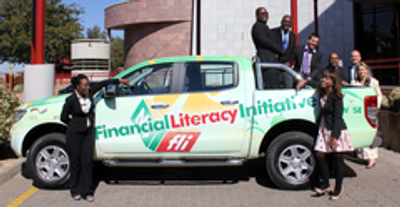First Published on Jun 18, 2014
On 12th June, the Deputy Permanent Secretary of the Ministry of Finance, Mr. I-Ben Nashandi, on behalf of the Honourable Saara Kuugongelwa-Amadhila, Minister of Finance together with His Excellency Onno Hückmann, Ambassador of the Federal Republic of Germany, launched the Financial Literacy Baseline Survey results. The launch took place at the Bank of Namibia and was hosted by the Governor Mr. Iipumbu Shiimi.
Members of the line ministries, Bank of Namibia, the German Embassy and FLI initiative(© German Embassy Windhoek) The Financial Literacy Baseline Survey for Namibia was commissioned by the Financial Literacy Initiative, carried out by Survey Warehouse and supported by the Deutsche Gesellschaft für Internationale Zusammenarbeit (GIZ) GmbH on behalf of the German Government.
As enshrined in Vision 2030, the 4th National Development Plan and the Namibia Financial Sector Strategy 2011- 2021, Namibia strives to achieve an inclusive financial sector as well as financially literate and protected consumers of financial services and products.

Against this background, there is a need for a national benchmark on financial literacy to enable the responsible institutions to monitor activities that are undertaken to achieve these development objectives. So far, research on financial literacy in Namibia had been insufficient to fully understand and quantify the needs of all target groups. The Financial Literacy Baseline Survey 2013 closed this knowledge gap.
By doing so, the Financial Literacy Baseline Survey aimed to:
- establish a baseline indicator for financial literacy in Namibia
- identify the financial education needs of enterprises, households, individuals and other target groups
- evaluate the impact of financial education activities that have been implemented by the Financial Literacy Initiative
What is Financial literacy?
According to the Financial Literacy Initiative (FLI), financial literacy is defined as “the ability to make informed judgements and take effective decisions regarding the use and management of money and on the knowledge and skills passed on by financial education” (FLI, 2012). Financial literacy as per this definition therefore consists of both a behavioural and knowledge component.
Financial Literacy Baseline Survey brochure(© German Embassy Windhoek) The financial literacy of the average Namibian above the age of 16 was calculated as 42.75 percent. The average score for financial knowledge (51.18 percent) was higher than that for financial behaviour (32.26 percent).
By using the collected and analysed information, progress and impact of future activities can be continuously measured. It is envisaged to carry out the Financial Literacy Baseline Survey on a regular basis.
The Minister of Finance, Honourable Saara Kuugongelwa-Amadhila, underlined that “the undertaking of the survey underscores the Government’s commitment to evidence-based policy and results-based intervention measures in the area of financial education”.
The Minister thanked the German government for its continued and reliable partnership in development cooperation. She also thanked the platform partners for their continued support.
His Excellency Onno Hückmann congratulated the initiative that it has already “reached out to approximately 300,000 Namibians in all 14 regions” and ensured that the German Government will “continue supporting the FLI for the next years to come”.
At the end of the ceremony, the German Ambassador handed over a vehicle to the Ministry of Finance that has been designed and branded to specifically support the road shows, special educational events and trainings on financial literacy.
© German Embassy Windhoek

